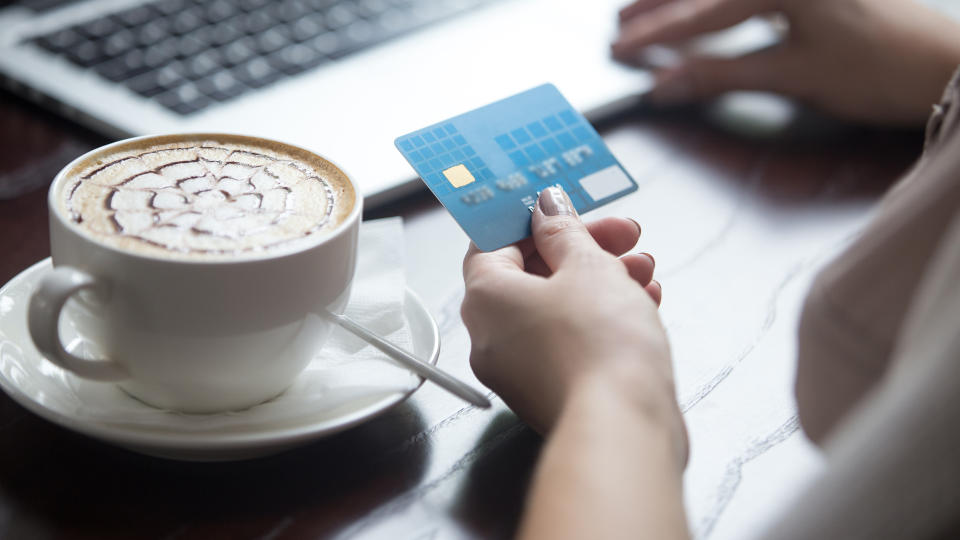Where Does Your Credit Card Fit Into Your Financial Planning? How To Use It Without Going Into Debt

Credit cards are a great financial tool and have several advantages: They can help you build or repair credit, rack up rewards and points and provide a financial safety net. Yet, with rates soaring, it can also be easy to accumulate debt very fast, which can end up costing you a lot.
To put this in context, the average credit card interest rate is 22.90% for new offers and 21.47% for existing accounts, according to WalletHub’s Credit Card Landscape Report.
Find: 5 Ways To Earn at Least 5% APY on Your Money (Without Using the Stock Market)
Read: Pocket an Extra $400 a Month With This Simple Hack
So before you regularly use a credit card as part of your financial plan, you need to know your limitations, said Jay Zigmont, PhD, CFP, founder and CEO of Childfree Wealth. For instance, if you can ensure that you never carry a balance month over month then you can leverage credit card points and cash back to your benefit.
“If you end up carrying a balance month to month, you may have just paid way too much in interest in comparison to any benefit,” Zigmont said.
Sponsored: Owe the IRS $10K or more? Schedule a FREE consultation to see if you qualify for tax relief.
How To Use Credit Cards as a Tool
Some people avoid credit cards due to the fear of “debt,” but it’s a tool, not a monster, said Joe Camberato, CEO of National Business Capital.
According to him, one mistake people make is missing potential savings by not using cash-back or reward cards.
“Using a debit card or cash for purchases you could have made on a credit card robs you of the cash back/savings you would generate, so make sure to think before you hit ‘purchase,'” he said. “Another problem comes up when you don’t accurately plan. If you ignore the cash back and extra profit from a credit card, your decisions may be based on wrong information, bringing in risks.”
Experts: Make These 7 Money Resolutions If You Want To Become Rich on an Average Salary
How Should People Use Credit Cards in Their Financial Planning?
Here are some helpful ways you can use your credit cards for financial planning.
By Changing Your Mindset
Changing mindsets around credit cards can be helpful — as a credit card, used carefully and with thought, can be a great financial asset and the key is to remember that it is just a convenience, not a license to spend.
“So it all goes back to your budget, better thought of as your spending plan. That plan should be aligned with your goals; what’s important for you to do and have in your life. Use of a credit card is simply a convenient way to pay for some of your expenses,” said Sean Fox, president of debt resolution at Achieve.
For instance, it can be helpful to use a credit card for several types of expenses, including travel and online ones, and they can be smart for online purchases because you can report any fraudulent purchase to your card issuer, he said, adding that many credit cards also provide some product warranty coverage.
“And, important for anyone looking to improve their financial situation, credit cards can be extremely useful in building credit profiles,” Fox said. “A history of paying on time, and of not carrying debt, can be helpful in obtaining any loans down the line, at the best interest rate.”
By Incorporating Them Into Your Budget
On the other hand, if you don’t see credit card use as simply a tool of convenience for taking care of the expenses you have planned in your budget, you can end up buying far more than you need or planned on, he said.
“It’s all too easy to fall into the trap of ‘keeping up with the Joneses’ or taking advantage of the latest trends or sales. Without incorporating credit card use into your spending plan expenses, you can start living beyond your means — and lose the ability to achieve the goals you’ve set,” Fox added.
And several experts echoed the sentiment — while credit cards are valuable tools, their misuse can transform them into dangerous liabilities in personal finance.
To avoid this, the balance should be paid off each month to avoid high-interest charges and debt accumulation, said Peter Earle, senior research fellow at American Institute for Economic Research.
“Once someone gets accustomed to using credit for splurges like vacations, etc., it’s all the more likely to become a hindrance to personal financial health,” he added.
Use Them as You Would Use Cash
Some experts argued that, ideally, people should use credit cards the same way they use debit cards or cash — and not as a substitute.
“Credit cards should be used with the intention of paying them off in full each month, rather than as a tool to buy items you can’t afford at the moment,” said Trae Bodge, smart shopping expert at TrueTrae.com.
“Of course, credit cards can be used as a financial stopgap, but ideally, you should know that the money to pay them off in full is coming that month,” Bodge said. “If that money isn’t coming, you shouldn’t use the credit card to purchase something unless it’s an emergency.”
More From GOBankingRates
This article originally appeared on GOBankingRates.com: Where Does Your Credit Card Fit Into Your Financial Planning? How To Use It Without Going Into Debt

 Yahoo Finance
Yahoo Finance 